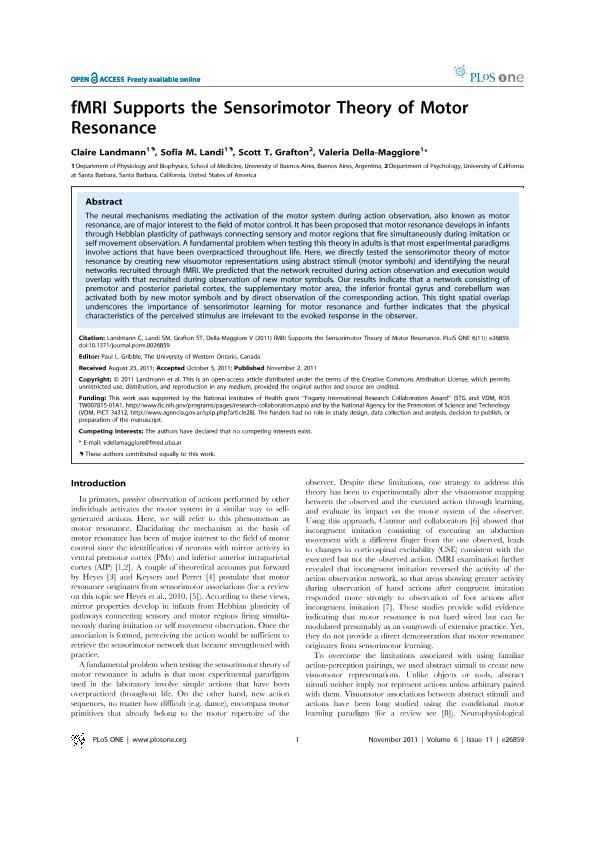Mostrar el registro sencillo del ítem
dc.contributor.author
Landmann, Claire

dc.contributor.author
Landi, Sofía Mariana

dc.contributor.author
Grafton, Scott T.

dc.contributor.author
Della Maggiore, Valeria Monica

dc.date.available
2017-05-11T18:55:50Z
dc.date.issued
2011-11
dc.identifier.citation
Landmann, Claire; Landi, Sofía Mariana; Grafton, Scott T.; Della Maggiore, Valeria Monica; fMRI supports the sensorimotor theory of motor resonance; Public Library of Science; Plos One; 6; 11; 11-2011; 1-8, e26859
dc.identifier.issn
1932-6203
dc.identifier.uri
http://hdl.handle.net/11336/16324
dc.description.abstract
The neural mechanisms mediating the activation of the motor system during action observation, also known as motor resonance, are of major interest to the field of motor control. It has been proposed that motor resonance develops in infants through Hebbian plasticity of pathways connecting sensory and motor regions that fire simultaneously during imitation or self movement observation. A fundamental problem when testing this theory in adults is that most experimental paradigms involve actions that have been overpracticed throughout life. Here, we directly tested the sensorimotor theory of motor resonance by creating new visuomotor representations using abstract stimuli (motor symbols) and identifying the neural networks recruited through fMRI. We predicted that the network recruited during action observation and execution would overlap with that recruited during observation of new motor symbols. Our results indicate that a network consisting of premotor and posterior parietal cortex, the supplementary motor area, the inferior frontal gyrus and cerebellum was activated both by new motor symbols and by direct observation of the corresponding action. This tight spatial overlap underscores the importance of sensorimotor learning for motor resonance and further indicates that the physical characteristics of the perceived stimulus are irrelevant to the evoked response in the observer.
dc.format
application/pdf
dc.language.iso
eng
dc.publisher
Public Library of Science

dc.rights
info:eu-repo/semantics/openAccess
dc.rights.uri
https://creativecommons.org/licenses/by/2.5/ar/
dc.subject
Motor Resonance
dc.subject
Action Observation
dc.subject
Sensorimotor Learning
dc.subject
Fronto-Parietal Networks
dc.subject.classification
Neurociencias

dc.subject.classification
Medicina Básica

dc.subject.classification
CIENCIAS MÉDICAS Y DE LA SALUD

dc.title
fMRI supports the sensorimotor theory of motor resonance
dc.type
info:eu-repo/semantics/article
dc.type
info:ar-repo/semantics/artículo
dc.type
info:eu-repo/semantics/publishedVersion
dc.date.updated
2017-05-10T20:00:13Z
dc.journal.volume
6
dc.journal.number
11
dc.journal.pagination
1-8, e26859
dc.journal.pais
Estados Unidos

dc.journal.ciudad
San Francisco
dc.description.fil
Fil: Landmann, Claire. Consejo Nacional de Investigaciones Científicas y Técnicas. Oficina de Coordinación Administrativa Houssay. Instituto de Fisiología y Biofísica Bernardo Houssay. Universidad de Buenos Aires. Facultad de Medicina. Instituto de Fisiología y Biofísica Bernardo Houssay; Argentina
dc.description.fil
Fil: Landi, Sofía Mariana. Consejo Nacional de Investigaciones Científicas y Técnicas. Oficina de Coordinación Administrativa Houssay. Instituto de Fisiología y Biofísica Bernardo Houssay. Universidad de Buenos Aires. Facultad de Medicina. Instituto de Fisiología y Biofísica Bernardo Houssay; Argentina
dc.description.fil
Fil: Grafton, Scott T.. University of California; Estados Unidos
dc.description.fil
Fil: Della Maggiore, Valeria Monica. Consejo Nacional de Investigaciones Científicas y Técnicas. Oficina de Coordinación Administrativa Houssay. Instituto de Fisiología y Biofísica Bernardo Houssay. Universidad de Buenos Aires. Facultad de Medicina. Instituto de Fisiología y Biofísica Bernardo Houssay; Argentina
dc.journal.title
Plos One

dc.relation.alternativeid
info:eu-repo/semantics/altIdentifier/url/http://journals.plos.org/plosone/article?id=10.1371/journal.pone.0026859
dc.relation.alternativeid
info:eu-repo/semantics/altIdentifier/doi/http://dx.doi.org/10.1371/journal.pone.0026859
dc.relation.alternativeid
info:eu-repo/semantics/altIdentifier/url/https://www.ncbi.nlm.nih.gov/pmc/articles/PMC3206875/
Archivos asociados
